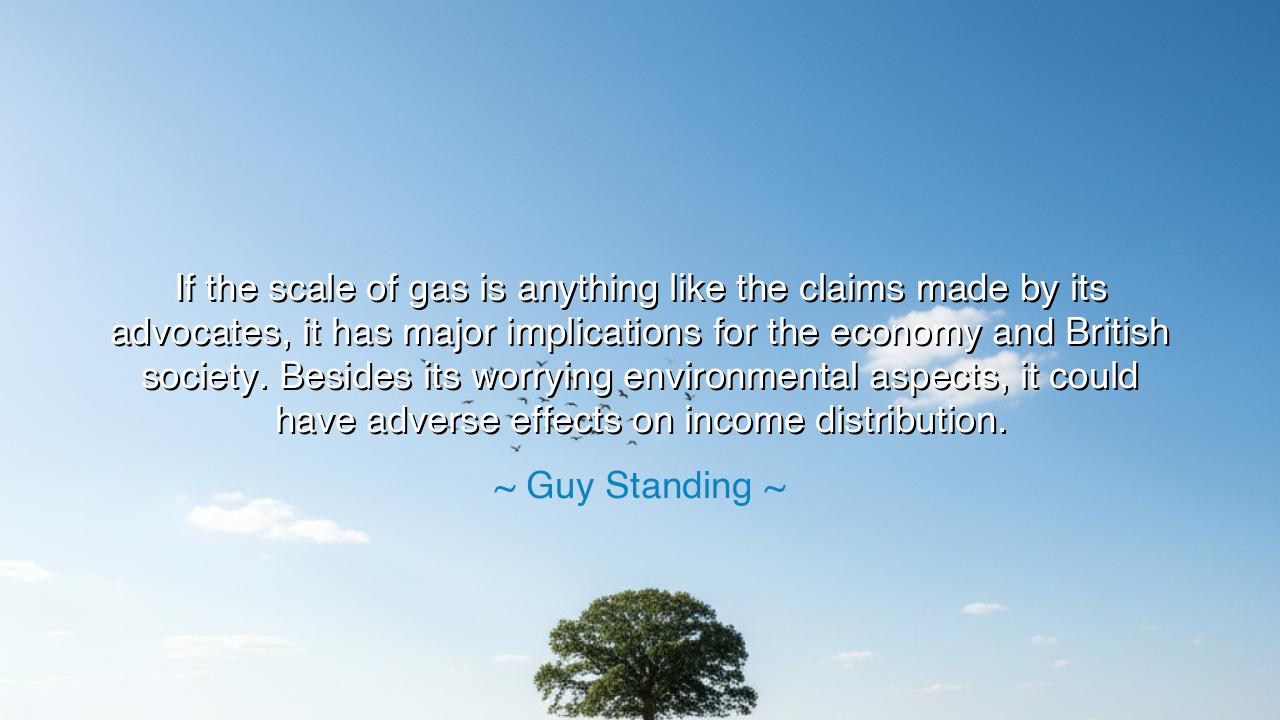
If the scale of gas is anything like the claims made by its
If the scale of gas is anything like the claims made by its advocates, it has major implications for the economy and British society. Besides its worrying environmental aspects, it could have adverse effects on income distribution.






The words of Guy Standing, scholar of inequality and the precariat, fall upon us with both warning and insight: “If the scale of gas is anything like the claims made by its advocates, it has major implications for the economy and British society. Besides its worrying environmental aspects, it could have adverse effects on income distribution.” In this teaching, he reveals that the treasures hidden in the earth are never without cost, and that wealth unearthed from soil and stone may carry not only promise but peril. He points to the double-edged nature of gas: that while its abundance may reshape nations, it may also fracture society, widen divides, and scar the environment itself.
At the heart of his words is the recognition that resources are never merely physical—they are social and moral as well. The extraction of gas, like oil before it, is not only an act of energy production but a transformation of power, wealth, and opportunity. Standing warns us that while advocates speak of prosperity, jobs, and energy security, the deeper reality may be that the spoils of such wealth do not fall equally. Instead, they flow to the few, leaving the many with scraps, and leaving behind the bitter fruits of pollution, displacement, and health risks. Thus, the promise of energy may also become the seed of inequality.
History itself provides ample testimony. The discovery of North Sea oil in the twentieth century was heralded as a triumph for Britain, a treasure that could fund prosperity for generations. Yet many observed that while the revenues enriched the treasury and fueled the engines of finance, much of the working population saw little transformation in their daily lives. Inequalities endured, and in some regions, worsened. The lesson is clear: resources alone do not guarantee justice. If not carefully governed, wealth from the earth may flow upward, not outward, entrenching privilege rather than lifting the people.
Standing’s words also strike at the environmental aspects of gas. For the very act of extraction—whether through fracking, drilling, or other means—can poison water, scar landscapes, and hasten the calamity of climate change. The irony he points to is sharp: a resource meant to fuel economic strength may in fact undermine the very foundation of long-term survival. What use is energy if it destroys the land, the air, and the health of those it was meant to serve? Here is the deeper warning: economic growth severed from ecological wisdom is but the shadow of prosperity, doomed to collapse upon itself.
But even beyond ecology, he points to the silent danger of income distribution. For when the gains of energy are concentrated in the hands of a few corporations or elites, the working class becomes more precarious, left to bear the environmental harms without reaping the rewards. In this sense, Standing reminds us that inequality is not only measured in wages but also in exposure to risk. The wealthy may profit from energy extraction, while the poor may find themselves living near the wells, breathing the fumes, or losing farmland and homes to industrial expansion.
The lesson of his words, then, is not a rejection of resources, but a call for justice in their governance. If gas is to be used, let it be stewarded with equity, its benefits shared broadly, its harms mitigated with care. Let governments act not as servants of corporations but as guardians of the people, ensuring that the bounty of the earth is not used to deepen division but to strengthen community. This is the true measure of wisdom: not how much is extracted, but how fairly it is distributed, and how carefully it is sustained.
Therefore, children of tomorrow, take heed of Guy Standing’s teaching. Be wary of promises that shine with quick prosperity but cast long shadows of inequality and destruction. Demand transparency, demand justice, demand that the earth’s wealth be used for the common good. Remember that true prosperity is not measured by the energy that flows through wires, but by the dignity and security of all who live in its light. Only when wealth is wedded to fairness, and growth to sustainability, shall society stand whole and unbroken.






AAdministratorAdministrator
Welcome, honored guests. Please leave a comment, we will respond soon